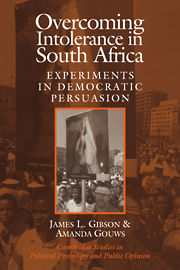Book contents
- Frontmatter
- Contents
- List of Tables and Figures
- Preface
- Part I Introduction
- Part II South African Intolerance as It Is
- 3 The Nature of Political Intolerance in South Africa
- 4 Social Identities, Threat Perceptions, and Political Intolerance
- 5 Making Tolerance Judgments: The Effect of Context, Local and National
- Part III South African Tolerance as It Might Be
- Appendix A Research Design and Methodology
- References
- Index
- Books in the series
3 - The Nature of Political Intolerance in South Africa
Published online by Cambridge University Press: 22 October 2009
- Frontmatter
- Contents
- List of Tables and Figures
- Preface
- Part I Introduction
- Part II South African Intolerance as It Is
- 3 The Nature of Political Intolerance in South Africa
- 4 Social Identities, Threat Perceptions, and Political Intolerance
- 5 Making Tolerance Judgments: The Effect of Context, Local and National
- Part III South African Tolerance as It Might Be
- Appendix A Research Design and Methodology
- References
- Index
- Books in the series
Summary
One of the most vexing problems facing regimes attempting democratic transformations is political intolerance. With majoritarian sentiment at its peak, with political conflict intensified by struggles over the fundamental contours of the new regime, and with dark fears of the status quo ante returning, that intolerance would be rife is not altogether unexpected. But without tolerance, it is all too easy for transitional regimes to devolve, first, into majority tyrannies, and second, into simple, oldfashioned tyrannies.
Consequently, social scientists have devoted considerable effort to understanding the causes and consequences of political intolerance. Defining tolerance as the willingness to allow all groups, irrespective of their political viewpoints, to compete for political power through legal and peaceful means, and relying upon a research tradition well established within relatively democratic polities, social scientists have investigated political intolerance as a crucial attribute of the political cultures of polities (see Almond and Verba 1963, 1980). The tool of this research is the opinion survey, and surveys have been conducted of mass and elite publics in many countries throughout the world in an effort to assess the ways in which intolerance affects democratic governance.
Nowhere is the problem of political intolerance more pressing than in South Africa. South Africa began its attempt at democratization in the early 1990s, with the capstone of the initiation stage being the free elections of April 1994 that brought Nelson Mandela and the African National Congress (ANC) to power. By the end of the century, virtually all of the institutional components of democratic government had been installed in South Africa, including a strong constitution, an effective and representative parliament, and an independent and powerful judiciary.
- Type
- Chapter
- Information
- Overcoming Intolerance in South AfricaExperiments in Democratic Persuasion, pp. 41 - 71Publisher: Cambridge University PressPrint publication year: 2002

